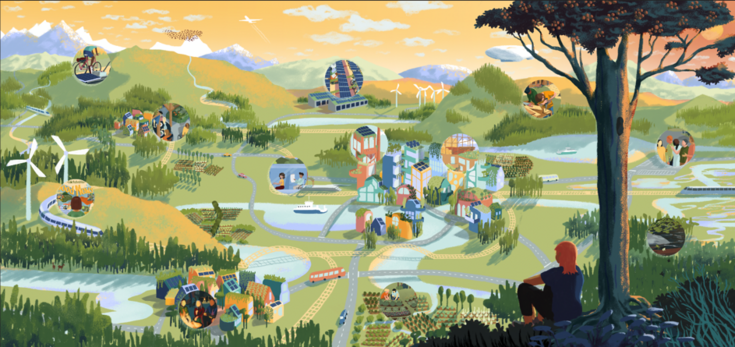06.12.2021 - StartClim: Planning, Education and Art for the Austrian Climate Change Adaptation
StartClim studies adaptation to climate change and, for years, has delivered scientific contributions to the implementation of the Austrian National Adaptation Strategy. The projects in StartClim2020/21 addressed various research questions, such as climate-resilient building, barriers to pro-environmental decision-making, a sustainable circular economy, management for inner-alpine grassland, the quantification of land use change, and climate change in the arts.
StartClim was created in 2003 by the Federal Ministry of Agriculture and Forestry with the aim to research climate change and counter-strategies. The program is scientifically managed by the Institute of Meteorology and Climatology of the University of Natural Resources and Life Sciences, Vienna, and administratively supervised by the Federal Environment Agency. The current final reports 2020/21 are now available.
Climate-resilient building
Post-modern society has seen an increase in urbanization on a global scale. People spend most of their lives primarily in building interiors in an urban environment that is strongly over-formed by buildings. The design of the built environment is subject to numerous normative requirements. These legal instruments, some of which have been in place for a long time, are often not in line with the new conditions and requirements described above. The aim and content of Norm2050 is therefore to analyse regulations, laws, standards and procurement guidelines that are relevant for achieving emission-reduced, climate-resilient buildings and living in Vienna by 2050, to identify obstacles, contradictions or missing information and to derive recommendations for action. Bottom line: The updating of climate datasets as a normative basis for the calculation of building qualities is seen as particularly relevant, and a corresponding adjustment is recommended. For example, the calculation of heating and cooling requirements of buildings according to ÖNORM B 8110-5 is based on temperature measurements from 1978 to 2007. Furthermore, it is recommended that a deconstruction and recycling concept and a material building passport be made obligatory in the planning phase of renovation projects, but especially in the case of new buildings.
Climate change in the arts
Many people have dystopian ideas and images of climate scenarios, which we as a society do not want. In order to make a climate-just future a reality, we need a counterbalance: ideas and images of what a climate-just future could look like if we manage to transform our society. However, many people are still unable to conceive what that might mean for future everyday life. The change-of-scenery project told a science-based, graphic story of what this climate-adequate future could look like. It drew on images and stories derived from interviews with climate pioneers and scientists and complemented them with statements from the relevant literature. The resulting wallpaper provides inspiration for discussion that goes beyond consideration of loss and damage, addressing opportunities and added-value transformative changes, e.g., quality of life, health, social cohesion.
The wallpaper can be downloaded online as a creative basis and can be printed for use at events (www.zukunftstapete.at)

Future wallpaper: overview with individual scenes
StartClim2020/21 was financed by Austrian Federal Ministry of Education, Science and Research, the Austrian Federal Ministry of Climate Action, Environment, Energy, Mobility, Innovation and Technology, the Austrian Klima- und Energiefonds, and the Federal Province of Upper Austria.
StartClim2020: Additional information and final reports
www.startclim.at
National Adaptation Strategy:
https://www.bmnt.gv.at/umwelt/klimaschutz/klimapolitik_national/anpassungsstrategie/strategie-kontext.html
Contact:
Assoc. Prof. Dr. Herbert Formayer
University of Natural Resources and Life Sciences, Vienna (BOKU)
Institute of Meteorology and Climatology
Tel: 01/47654-81415;
E-Mail: herbert.formayer@boku.ac.at
Mag.a Sabine Enzinger
Federal Environment Agency, Presse
Tel.:01/31304-5488
E-mail: sabine.enzinger(at)umweltbundesamt.at
Mag.a Katja Hoyer
Klima- und Energiefonds
Tel.: +43 1 5850390-23
E-Mail: katja.hoyer@klimafonds.gv.at
